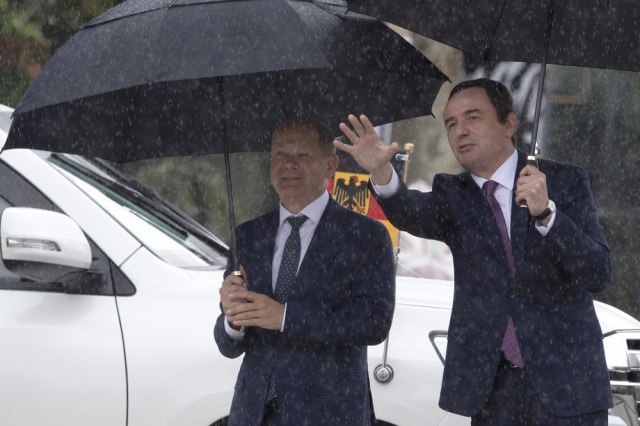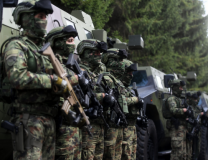Germans work on drafting CSM statute, the document is secret; How did that happen?
"Friedrich Ebert Stiftung" and the European Institute for Peace were entrusted with the task of drafting the Statute of the Community of Serbian Municipalities.
Source: Novosti
The German Foundation "Friedrich Ebert Stiftung" (FES) and the European Institute for Peace (EIP) were entrusted with the task of drafting the Statute of the Community of Serbian Municipalities.
The mentioned organizations have been working on that document for the last months, and the revised version, which should contain the comments of Serbian and Albanian NGOs in Kosovo and Metohija, should be on the desk of the EU's special representative for the dialogue between Belgrade and Pristina, Miroslav Lajčak, writes "Novosti".
As the newspaper learns from diplomatic circles, on Tuesday, a meeting was organized in Belgrade, in the premises of the "Aeroclub", with the participation of representatives of Serbian and Albanian NGOs and international missions from Kosovo, as well as German diplomats.
They were presented with the draft of the future statute of the CSM, on which they could make comments and suggestions.
The Serbian side was represented by Milica Andrić Rakić, Jovana Radosavljević, Aleksandar Rapajić, as well as Aleksandra Spremo from Yukom. The mentioned document, as "Novosti" has learned, is not intended for publication, but to become part of the negotiation process after the objections that are expressed, that is, to be negotiated with "the government of the so-called Kosovo and the Serbian government, and then to be shared with a third party", but it is not specified with which one.
We're guessing that it will be Germany, which is directly involved in the process through FES, and it was said at the meeting that official Berlin is open to suggestions.
On the basis of the presented Draft Statute, representatives of NGOs, among other things, had a dilemma whether CSM is a legal entity or should be a state body. They expressed their fear that under this draft, Serbs would have even fewer rights than those currently granted by the Kosovo constitution.
They were also bothered by the fact that the text emphasizes that everything must be in accordance with the Kosovo constitution, and the Constitutional Court there has already declared that the CSM is not in accordance with the highest legal act.
The participants also stated that official Berlin is open to suggestions. Criticisms presented at the meeting should subsequently, according to an objective assessment, be included in the final draft of the CSM Statute, which would be prepared by "Friedrich Ebert" and the European Institute for Peace, and which would ultimately be submitted to Lajčak for further use and offer to the Serbian and the Albanian side in the dialogue. And here comes the point of contention in this whole process.
First of all, the question is how it came to be that the core of the Brussels Agreement, namely the CSM, was left to the will of a German non-governmental organization, which, according to many, discredits the entire process, as well as the EU itself as the sponsor of the dialogue and Lajčak as the envoy for the dialogue.
Especially considering that he was given the mandate for this job by all EU members, including five countries that do not recognize Kosovo's independence. Now the entire process of drafting the statute is being directed by a German NGO, that is, Berlin, which is one of the most vocal founders of Kosovo and which is asking Serbia to recognize Kosovo as a condition for entering the EU.
Then, it is problematic that the political option that has by far the strongest support among the Serbs in Kosovo, which is the Serbian List, was not invited to the talks on the draft of a vitally important document for the Serbian people in Kosovo. Preference was given to the heads of the NGO sector in Serbian communities in Kosovo, who have no legitimacy among our compatriots.
As "Novosti" has learned, Lajčak should meet with the representatives of Serbian and Albanian NGOs who were "combing" the outline of the proposed statute of the CSM in Belgrade today in Berlin, at the conference of the European Council on Foreign Relations (ECFR), an organization currently co-chaired by Carl Bildt.
Prishtina's chief negotiator Besnik Bislimi and State Secretary of the Ministry of Foreign Affairs Nemanja Starović were initially invited to the panel with Lajcak. However, at the last minute, the organizers requested that, at the request of Lajčak, Bislimi and Starović not attend the meeting, so that the EU envoy "could communicate more openly with representatives of the civil sector".
The former head of diplomacy, Vladislav Jovanović, indicates to Novosti that the inclusion of Germany, through the "Friedrich Ebert" Foundation, in the drafting of the CSM Statute is not encouraging, given the decades-long negative role of Berlin, first in the destruction of the SFRY, and then in the subsequent crisis stages in which the Serbs and Serbia bore the brunt of the victims precisely because of Berlin's extreme policy.
"Germany was among the countries that advocated the NATO intervention the most in 1999. Lajčak, as in his previous positions and in this one as an emissary for dialogue, is clearly not completely independent, but rather to the greatest extent the executor of the order".
Dejan S. Miletić, from the Center for the Study of Globalization, believes that this is about the continuous loss of the position of the mediator in the dialogue, which should be status neutral, to convince both parties to work in the interest of the agreement, and not to act in the interest of one party.
"With this move, the credibility of the EU continues to collapse, in which there is no consensus on the issue of Kosovo's independence. Everything that is done in favor of one side or in the direction of prejudicing Kosovo status is the wrong direction and cannot bring results.
According to Ognjen Karanović, from the Center for Social Stability, instead of dealing with the issue of the CSM Statute, official Berlin should force Pristina to implement the Brussels Agreement and form the CSM, and the Statute should be defined by those whose community it is - Kosovo Serbs.
"Unfortunately, official Berlin has so far had no intention of seriously dealing with this issue and removing the pressure on Kurti, who, after all, is acting on their orders," said Karanović.
It is interesting that the draft proposal for the statute of the CSM does not directly mention the Brussels Agreement, i.e. the first agreement on the principles governing the normalization of relations, initialed in 2013 by Belgrade and Pristina with the guarantee of the EU. The Brussels Agreement is mentioned at the beginning of the text of the Draft, but indirectly, again under the guise of Kosovo laws and the Constitution.
Thus, the first article of the Draft reads: "The Association - Community of municipalities with a Serbian majority in Kosovo is a legal entity in accordance with the Law on Ratification of the First Agreement and the Constitution of the Republic of Kosovo".











